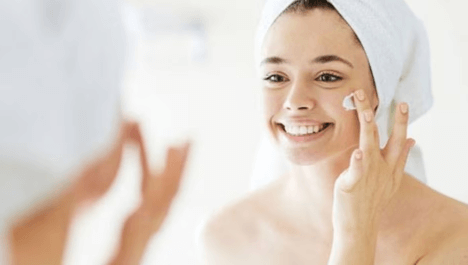skin care in hindi wellhealthorganic

Maintaining healthy skin requires a consistent routine, a balanced diet, and understanding your unique skin needs. This article explores skin care in hindi wellhealthorganic tips and techniques in Hindi, focusing on different skin types, natural ingredients, home remedies, and debunking common myths.
Introduction to Skin Care
Skin care involves practices that support skin integrity, enhance its appearance, and relieve skin conditions. Basic skin care routines include cleansing, moisturizing, and protecting your skin from the sun. Understanding your skin’s needs is crucial to developing an effective regimen that keeps your skin healthy and glowing.
Benefits of Regular Skin Care
Regular skin care can prevent various skin issues, delay aging, and enhance your overall appearance. Consistent care helps maintain the skin’s natural moisture, elasticity, and barrier function. It also ensures that your skin remains free from infections, inflammation, and other common problems.
Understanding Different Skin Types
Identifying your skin type is the first step to effective skin care. The main skin types are:
- Normal Skin: Well-balanced, not too oily or dry, with few imperfections.
- Oily Skin: Produces excess sebum, shiny appearance, prone to acne and enlarged pores.
- Dry Skin: Lacks moisture, feels tight, rough, or flaky.
- Combination Skin: Both oily and dry areas, usually oily in the T-zone and dry on the cheeks.
- Sensitive Skin: Reacts easily to products and environmental factors, leading to redness, itching, or irritation.
Identifying Your Skin Type
To identify your skin type, observe your skin’s behavior throughout the day. Cleanse your face and leave it bare for a few hours. If your skin feels tight, it’s likely dry. If it appears shiny and greasy, it’s oily. A mix of oily and dry areas indicates combination skin, while normal skin feels comfortable and balanced. Sensitive skin will show signs of irritation or redness.
Daily Skin Care Routine
A consistent daily skin care routine is essential for maintaining healthy skin. Tailor your routine to your skin type and include morning and night practices.
Read Also wellhealthorganic.com/easily-remove-dark-spots-lemon-juice
Morning Skin Care Routine
Start your day with a refreshing and protective routine:
- Cleansing: Use a gentle cleanser to remove overnight buildup.
- Toning: Apply a toner to balance your skin’s pH and tighten pores.
- Moisturizing: Use a lightweight moisturizer to keep your skin hydrated.
- Sunscreen: Apply sunscreen with at least SPF 30 to protect against UV rays.
Night Skin Care Routine
Nighttime is crucial for skin repair and regeneration:
- Removing Makeup: Use a makeup remover or oil cleanser to eliminate makeup and impurities.
- Cleansing: Follow up with a gentle cleanser.
- Toning: Apply toner to refresh and prepare your skin for the next steps.
- Moisturizing: Use a richer moisturizer or night cream to nourish your skin overnight.
Weekly Skin Care Routine
Incorporate weekly treatments to enhance your skin care routine:
- Exfoliation: Removes dead skin cells, unclogs pores, and smoothens skin. Do this 1-2 times a week.
- Face Masks: Hydrating, purifying, or soothing masks depending on your skin’s needs. Use masks once a week.
Importance of Cleansing, Toning, and Moisturizing
These three steps form the foundation of any skin care routine:
- Cleansing: Removes dirt, oil, and impurities. Use a gentle cleanser suited to your skin type.
- Toning: Balances the skin’s pH, tightens pores, and prepares the skin for moisturizing.
- Moisturizing: Keeps the skin hydrated and locks in moisture. Choose a moisturizer appropriate for your skin type.
Natural Ingredients for Skin Care
Natural ingredients can be highly effective in maintaining healthy skin. They are often free from harsh chemicals and provide multiple skin benefits.
Read Also wellhealthorganic home remedies tag
Benefits of Aloe Vera
Aloe vera is known for its soothing and hydrating properties:
- Hydration: Helps retain moisture and soothe dry skin.
- Reducing Inflammation: Calms irritated skin and reduces redness.
- Healing Properties: Promotes wound healing and can help with minor cuts and burns.
Benefits of Turmeric
Turmeric is celebrated for its antiseptic and anti-inflammatory properties:
- Antiseptic Properties: Helps combat bacteria and reduce acne.
- Enhancing Skin Glow: Brightens the skin and improves complexion.
- Treating Acne: Its anti-inflammatory properties help reduce acne and prevent future breakouts.
Benefits of Honey
Honey is a natural humectant and has antibacterial qualities:
- Moisturizing: Provides deep hydration and locks in moisture.
- Antibacterial Properties: Helps fight acne-causing bacteria.
- Softening Skin: Leaves the skin soft and supple.
Benefits of Rose Water
Rose water is a versatile ingredient with skin care in hindi wellhealthorganic:
- Toning: Acts as a gentle toner, tightening pores and balancing pH.
- Reducing Puffiness: Can reduce under-eye puffiness and refresh tired skin.
- Refreshing Skin: Provides a refreshing boost to the skin, leaving it revitalized.
Benefits of Neem
Neem is known for its potent antibacterial and antifungal properties:
- Antibacterial Properties: Helps treat and prevent acne.
- Treating Acne: Reduces inflammation and clears clogged pores.
- Cleansing Skin: Deeply cleanses the skin and removes impurities.
Home Remedies and DIY Treatments
Simple home remedies using natural ingredients can enhance your skin care routine:
- Yogurt and Gram Flour Face Pack: Mix equal parts yogurt and gram flour to form a paste. Apply to your face, leave it on for 15-20 minutes, then rinse off. It exfoliates dead skin cells, brightens the complexion, and provides hydration.
- Turmeric and Milk Face Pack: Mix a teaspoon of turmeric with two tablespoons of milk. Apply to your face, leave it on for 15 minutes, then rinse off. This pack helps in reducing acne, evening out skin tone, and providing a natural glow.
- Lemon and Honey Face Pack: Mix one tablespoon of honey with a few drops of lemon juice. Apply the mixture to your face, leave it on for 10-15 minutes, then rinse off. It brightens the skin, reduces blemishes, and hydrates.
Healthy Diet for Glowing Skin
Your diet plays a significant role in the health of your skin. Consuming the right nutrients can improve your skin’s appearance and condition:
- Essential Nutrients for Skin: Vitamin C, Vitamin E, Omega-3 fatty acids, and Antioxidants are particularly beneficial.
- Foods Beneficial for Skin: Incorporate fruits and vegetables, nuts and seeds, fatty fish, and green tea into your diet.
- Foods to Avoid for Healthy Skin: Processed foods, sugar, excess salt, and fried foods can contribute to skin problems.
Addressing Common Skin Problems
Many people face common skin problems like acne, wrinkles, dark circles, and sunburn:
- Treating Acne: Acne can be caused by various factors, including hormones and diet. Use home remedies like tea tree oil, honey, and aloe vera, or seek medical treatments such as over-the-counter treatments and prescription medications.
- Reducing Wrinkles: Wrinkles are a natural part of aging but can be minimized with aloe vera, egg whites, and coconut oil. Medical treatments include retinoids, chemical peels, and laser treatments.
- Lightening Dark Circles: Dark circles can be caused by lack of sleep, genetics, and aging. Home remedies include cucumber slices, potato slices, and rose water, while medical treatments involve topical creams, chemical peels, and laser treatments.
- Treating Sunburn: Sunburn can cause long-term skin damage. Home remedies include aloe vera, cold compresses, and hydrating lotions. Severe cases may require prescription creams and medications.
Common Skin Care Myths
Debunking common skin care myths can help you make better choices:
- Myths About Acne: Acne is not caused by dirty skin. It is caused by various factors, including hormones and bacteria.
- Myths About Sunscreen: Sunscreen should be worn daily, even on cloudy days, as UV rays can penetrate clouds.
- Myths About Moisturizer: All skin types, including oily skin, need hydration.
Common Skin Care Mistakes
Avoiding these common mistakes can improve your skin health:
- Over-Exfoliating: Too much exfoliation can damage the skin’s protective barrier.
- Using Too Many Products: Using multiple products can irritate the skin and cause adverse reactions.
- Not Choosing the Right Products: Using products not suited for your skin type can lead to issues like breakouts and dryness.
FAQs
What should I eat for healthy skin?
Incorporate fruits, vegetables, nuts, seeds, fatty fish, and green tea into your diet for better skin health.
How can I prevent acne?
Maintain a consistent skin care routine, avoid touching your face, and use non-comedogenic products.
How can I reduce wrinkles?
Use products with retinoids, keep your skin hydrated, and protect it from sun exposure.
How can I treat dark circles?
Use home remedies like cucumber and potato slices, get adequate sleep, and use an eye cream with caffeine or vitamin K.
Why is sunscreen important?
Sunscreen protects your skin from harmful UV rays, preventing sunburn, premature aging, and skin cancer.
How can I use natural ingredients for skin care?
Natural ingredients like aloe vera, honey, turmeric, and rose water can be used in DIY masks and treatments to improve skin health.
Conclusion
Maintaining skin care in hindi wellhealthorganic requires a balanced approach involving proper skin care routines, a nutritious diet, and the use of natural ingredients. By understanding your skin type and addressing common issues with effective remedies and treatments, you can achieve glowing, healthy skin. Consistency is key, so make skin care a regular part of your daily routine for the best results.






